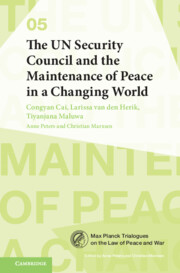The UN Security Council and the Maintenance of Peace in a Changing World
How can the UN Security Council contribute to the maintenance of international peace and security in times of heightened tensions, global polarisation, and contestation about the principles underlying the international legal and political order? In this Trialogue, experts with diverse geographic, socio-legal, and ideational backgrounds present their perspectives on the Security Council’s historic development, its present functions and deficits, and its defining tensions and future trajectories. Three approaches engage with each other: a power-focused approach emphasising the role of China as an emerging actor; an institutionalist perspective exploring how less powerful states – particularly the elected members of the Security Council – exert influence and may strengthen rule-of-law standards; and a regionalist perspective investigating how the Security Council, as the central actor, can cooperate with regional organisations towards maintaining international peace and security. This title is also available as Open Access on Cambridge Core.
Congyan Cai is a professor of international law at Fudan University, China. He engages with international legal theory, foreign relations law, and Chinese international legal policies and practice. Professor Cai’s recent books include The Rise of China and International Law (2019) and The Cambridge Handbook of China and International Law (Cambridge, 2024, co-editor).
Larissa van den Herik is a full professor at the Grotius Centre for International Legal Studies of Leiden University. She served as vice dean of Leiden Law School and previously chaired the ILA Study Group on UN Sanctions and International Law. Professor Van den Herik is general editor of the Cambridge Studies in International and Comparative Law and of the Leiden Journal of International Law. She is a member of the Permanent Court of Arbitration and the Netherlands National Group.
Tiyanjana Maluwa is the H. Laddie Montague Chair in Law and a professor of law and international affairs at Pennsylvania State University School of Law, as well as a member of the Institut de Droit International. Professor Maluwa’s recent publications include The Pursuit of a Brave New World in International Law: Essays in Honour of John Dugard (2017, co-editor), and Dugard’s International Law: A South African Perspective (5th edn, 2018).
Anne Peters is a director at the Max Planck Institute for Comparative Public Law and International Law in Heidelberg, a professor at Heidelberg, FU Berlin, and Basel, and L. Bates Lea Global Law Professor at the University of Michigan. She is a member of the Permanent Court of Arbitration and an associate member of the Institut de Droit International.
Christian Marxsen is a professor of international law at Humboldt-University of Berlin and a research group leader at the Max Planck Institute for Comparative Public Law and International Law, Heidelberg.
